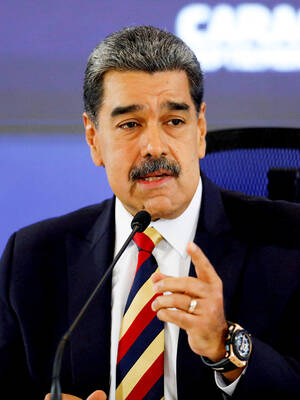On the grounds of the Bodyworks weight loss campus in Beijing, 30 tubby men and women sweat profusely, gasping for air as they pound the treadmills in an exercise room.
They represent a shocking new statistic in the world’s most populous country. According to some estimates, one-third of China’s population — about 429 million — are overweight or obese, prime candidates for diabetes and heart disease.
China is growing fatter faster than any developing nation except Mexico, with grave implications for the work force and economic growth in the world’s second-biggest economy.

Photo: Reuters
At the Bodyworks campus, they range in age from seven to 55 and come from across China. Each pays 30,000 yuan (US$4,696) for the six-week program.
For their money, they receive balanced meals and exercise for six hours each day. The regimen includes weight training, running, yoga and football.
“For the first two to three weeks, it was especially hard. I cried on the phone to my parents and told my father, ‘I can’t make it,’” said Zhang Fang, a 28-year-old employee with China Unicom from Shanxi Province. “My mother said: ‘If you don’t continue, you’re finished. You need your health.’”
When Zhang joined the camp, she weighed 150kg, had high blood pressure and had trouble breathing when she walked. She has lost 50kg in one year.
“Now I’m a fat person, but at least I’m not a super-sized fat person,” Zhang said.
Though most Chinese think a chubby child is a healthy child, society can be less tolerant of overweight adults, who complain of not being able to find jobs.
“I want to give people a good impression when I go for interviews,” said Zheng Xiaojie, a 22-year-old university student from Xinjiang, who has lost over 5kg in seven weeks. “People feel more comfortable about thinner people.”
Obesity is most acute in big urban cities such as Beijing and Shanghai, where people enjoy higher incomes, eat richer foods and lead more sedentary lifestyles.
“Urban China got richer. It’s just gone out and bought itself more food and bought itself cars and couches to sit on while watching TV,” said Paul French, co-author of Fat China: How Expanding Waistlines are Changing a Nation.
Mu Ge, the sales manager at Bodyworks, said the most glaring difference between China and other countries “is that the rich people in China are all extremely fat ... in other countries, the wealthy are all very thin and beautiful.”
“In the UK, only the poor people will eat junk food, and will therefore be fat,” Mu said. “In China, it’s the opposite. The more money you have, the fatter you are. It’s almost as if it’s proof that living standards have improved.”
Dressed in an oversized t-shirt that did little to conceal his rotund belly, Liu Chi has lost more than 10kg since he first entered Bodyworks six weeks ago and now weighs in at about 90kg.
To Liu, his progress represents a new lease on life — one he hopes will include a girlfriend and fewer taunts.
“I had an inferiority complex,” said the cherub-faced 20-year-old student from Hebei Province. “People will look at me on the streets and ask: ‘How heavy are you?’”
Ding Zongyi, a professor at the Chinese Medical Doctor Association, who has been studying obesity in China for the past 30 years, said the obesity rate has jumped 158 percent since 1996 to 2006 and is set to rise further.
Even the most conservative assumptions have the rate of change in the numbers of overweight and obese people in China doubling over the next two decades, Barry Popkin, professor of nutrition at the University of North Carolina, wrote in the July/August 2008 issue of the journal Health Affairs.
Health experts say that the speed with which China is putting on weight is alarming.
“In America and Europe, they had to go through the whole process of inventing supermarkets and processed food,” French, the writer, said. “It took stages in the West. The Chinese didn’t have to invent the Mars bar. It was given McDonald’s, KFC, Tesco and Wal-Mart.”
KFC parent Yum Brands Inc say the Chinese market is its main earnings driver and McDonald’s said China has been the fastest-growing market for the firm worldwide in terms of the number of new restaurants opening.
Popkin said in e-mailed comments that more fried food, consumption of food from animal sources, sugared drinks and too few vegetables have contributed to China’s expanding girth.
Although fast food is a major culprit, extra-high amounts of salt, sugar and oil in Chinese cooking is another factor contributing to the sharp rise in obesity.
And while China’s obesity rate is still half that in the US, the UK and Australia, it has led to a worrying rise in chronic non-communicable diseases such as cancer, strokes, heart disease and diabetes.
In many developed nations, obesity is fast replacing tobacco as the most important preventable cause of chronic non-communicable diseases, health experts warned.
About 12 percent of seven to 18 years old in China are overweight or obese, Popkin said.
The number of people suffering from diabetes has reached 92 million in China, nearly 10 percent of its population of 1.3 billion, according to a study in March last year in the New England Journal of Medicine.
The economic costs of obesity are enormous, Popkin said, in terms of treatment costs, paid sick leave, loss of productivity, disability and premature death.
The indirect effect of obesity and obesity-related dietary and physical activity patterns was 3.58 percent of GDP in 2000 and projected to reach 8.73 percent in 2025, Popkin wrote.
Ding said there had been no action taken by the government to address the problem.
“The government pays little attention to obesity partially because many parents and even doctors still lack the awareness to recognize and seriously cope with obesity as a problem,” he said.

VENEZUELAN ACTION: Marco Rubio said that previous US interdiction efforts have not stemmed the flow of illicit drugs into the US and that ‘blowing them up’ would US President Donald Trump on Wednesday justified a lethal military strike that his administration said was carried out a day earlier against a Venezuelan gang as a necessary effort by the US to send a message to Latin American cartels. Asked why the military did not instead interdict the vessel and capture those on board, Trump said that the operation would cause drug smugglers to think twice about trying to move drugs into the US. “There was massive amounts of drugs coming into our country to kill a lot of people and everybody fully understands that,” Trump said while hosting Polish President

China on Monday announced its first ever sanctions against an individual Japanese lawmaker, targeting China-born Hei Seki for “spreading fallacies” on issues such as Taiwan, Hong Kong and disputed islands, prompting a protest from Tokyo. Beijing has an ongoing spat with Tokyo over islands in the East China Sea claimed by both countries, and considers foreign criticism on sensitive political topics to be acts of interference. Seki, a naturalised Japanese citizen, “spread false information, colluded with Japanese anti-China forces, and wantonly attacked and smeared China”, foreign ministry spokesman Lin Jian told reporters on Monday. “For his own selfish interests, (Seki)

Japan yesterday heralded the coming-of-age of Japanese Prince Hisahito with an elaborate ceremony at the Imperial Palace, where a succession crisis is brewing. The nephew of Japanese Emperor Naruhito, Hisahito received a black silk-and-lacquer crown at the ceremony, which marks the beginning of his royal adult life. “Thank you very much for bestowing the crown today at the coming-of-age ceremony,” Hisahito said. “I will fulfill my duties, being aware of my responsibilities as an adult member of the imperial family.” Although the emperor has a daughter — Princess Aiko — the 23-year-old has been sidelined by the royal family’s male-only

A French couple kept Louise, a playful black panther, in an apartment in northern France, triggering panic when she was spotted roaming nearby rooftops. The pair were were handed suspended jail sentences on Thursday for illegally keeping a wild animal, despite protesting that they saw Louise as their baby. The ruling follows a September 2019 incident when the months-old feline was seen roaming a rooftop in Armentieres after slipping out of the couple’s window. Authorities captured the panther by sedating her with anesthetic darts after she entered a home. No injuries were reported during the animal’s time on the loose. The court in the